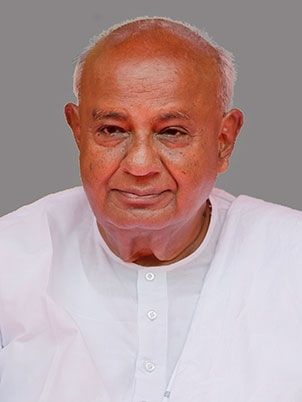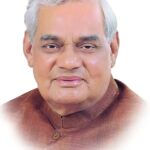H. D. Deve Gowda: A Legacy of Dedication, Struggles, and Leadership
H. D. Deve Gowda, a prominent Indian politician and the 14th Prime Minister of India, is best known for his humble beginnings, deep-rooted connection to the people of Karnataka, and his visionary leadership during one of the most challenging periods in Indian politics. Throughout his political career, Deve Gowda’s decisions and leadership style left an indelible mark on both the state and national levels. His life story is a testament to perseverance, integrity, and public service.
Early Life and Background: H. D. Deve Gowda
H. D. Deve Gowda was born on May 18, 1933, in the village of Haradanahalli in the Hassan district of Karnataka. Growing up in a farming family, Deve Gowda was exposed to the realities of rural life early on, which influenced his future political journey. He completed his education at the Government High School in Hassan before pursuing his degree at the local government college.
Although Deve Gowda came from a modest background, he showed a keen interest in public affairs from a young age. His early life was shaped by the struggles faced by farmers and the rural community, a theme that would later define much of his political agenda. With a deep sense of responsibility toward the welfare of farmers and the rural population, Deve Gowda began to involve himself in the local politics of Karnataka.
Political Journey: From Rural Leader to Prime Minister; H. D. Deve Gowda
Deve Gowda’s political career began in the 1950s when he joined the Indian National Congress (INC), the party led by Jawaharlal Nehru. He later shifted allegiance to the Janata Dal, a party that became instrumental in his rise to national politics. His early leadership roles in Karnataka began when he served as a member of the Karnataka Legislative Assembly in 1962. His political acumen and ability to relate to the common people earned him respect across political divides.
In 1994, Deve Gowda became the Chief Minister of Karnataka, where he focused on rural development, farmers’ welfare, and improving the state’s infrastructure. Under his leadership, Karnataka saw notable progress in irrigation projects, agricultural reforms, and the development of roads and other infrastructure. His political career reached its zenith in 1996 when he became the Prime Minister of India.
As the leader of the United Front, a coalition of regional and left-wing parties, Deve Gowda’s tenure as Prime Minister was a period of political instability, but he was highly regarded for his commitment to keeping the country together and his transparent approach to leadership. While his time as Prime Minister was short (1996-1997), it marked a significant moment in Indian politics as he became the first Prime Minister to come from a regional party rather than a national one.
Key Contributions and Leadership Style: H. D. Deve Gowda
Focus on Rural Development and Farmer Welfare
One of H. D. Deve Gowda’s most significant contributions was his unwavering focus on rural development and the welfare of farmers. As both Chief Minister of Karnataka and Prime Minister of India, he remained deeply concerned with issues facing rural populations. During his tenure as Chief Minister, Deve Gowda championed irrigation projects, promoted agricultural reforms, and advocated for policies that supported farmers’ needs.
He believed that India’s true strength lay in its villages, and his policies were aimed at empowering rural communities. His concern for farmer’s rights and agriculture shaped his entire political philosophy, and even in the national arena, he pushed for policies that would benefit the rural poor.
Political Integrity and Leadership During Challenging Times
Deve Gowda’s leadership was characterized by his integrity and transparency. He was often seen as a man of his word, maintaining a sense of trust with both his colleagues and the public. While his time as Prime Minister was marked by coalition politics, Deve Gowda was known for his diplomatic approach to managing complex political situations. Despite the challenges, he continued to advocate for policies that promoted social justice and equality.
Challenges Faced and How He Overcame Them: H. D. Deve Gowda
Deve Gowda’s rise to the office of Prime Minister was not without its challenges. Coming from a regional party, he faced difficulties in building a cohesive government with multiple regional and national parties. Despite these challenges, his ability to maintain stability in his coalition and his efforts to push forward with his agenda won him respect.
On a personal level, Deve Gowda also faced considerable opposition from political rivals, both at the state and national levels. Despite the hardships, he was persistent in his dedication to his cause. His leadership during the 1990s—particularly when the country was facing economic turbulence—highlighted his resilience and commitment to the nation.
Significance and Legacy: H. D. Deve Gowda
A Champion of Federalism
Deve Gowda’s leadership was a testament to his strong belief in federalism and the power of regional politics. As the leader of a regional party who rose to the level of Prime Minister, he demonstrated that India’s federal structure was not a hindrance to governance but a source of strength. His tenure inspired other regional parties and leaders to aim for more prominent roles in national politics.
His legacy is also rooted in his ability to bring together disparate political forces. His tenure proved that a government could function effectively despite the complexities of coalition politics. His focus on decentralizing power and prioritizing regional needs and concerns remains relevant in India’s political discourse today.
Daily Life and Impact on Society: H. D. Deve Gowda
Despite his stature in the political world, Deve Gowda lived a relatively simple life. He continued to maintain close ties to his rural roots and always remained connected with the grassroots level of politics. He was often seen in his traditional attire—simple, yet symbolizing his unpretentious approach to life.
His leadership was marked by a profound commitment to social causes, particularly the upliftment of farmers and rural communities. The people of Karnataka, in particular, remember him for his humble demeanor and the belief he instilled in them that their concerns were of national importance. His governance was often seen as an embodiment of the challenges and opportunities facing India’s rural populace.
FAQs about H. D. Deve Gowda
Q1: What were H. D. Deve Gowda’s key achievements as Prime Minister?
Deve Gowda’s tenure as Prime Minister is marked by his leadership of a coalition government during a period of instability. His focus on federalism, rural development, and infrastructure projects was central to his leadership.
Q2: How did Deve Gowda impact the state of Karnataka?
As Chief Minister of Karnataka, Deve Gowda worked extensively on irrigation, agriculture, and infrastructure, significantly improving the lives of farmers and rural communities in the state.
Q3: Why is H. D. Deve Gowda important in India’s political history?
Deve Gowda’s rise from a regional leader to the Prime Minister of India represents the growing influence of regional parties in national politics. His commitment to decentralizing power and advocating for the welfare of rural India remains a significant part of his legacy.
H. D. Deve Gowda’s legacy transcends political boundaries. Through his dedication to rural India, focus on social welfare, and ability to unite disparate forces, he remains a respected figure in Indian politics. His tenure, though brief as Prime Minister, made lasting contributions to India’s political landscape, and his story continues to inspire future generations.










